First-hand from Gaza
The following is a string of messages received by a reader of Canadian Mennonite who worked in Israel-Palestine. She received the messages on October 30 from a friend in Gaza who lost 19 family members in the bombing two days before. The person has two pre-school sons and is now sheltering in a UN school. Names are withheld for security reasons. Used with permission.
I’m really so worry
See die all the time
They all the time do bombing
I’m not sleep
Worry
What I do?
I’m not see news say for stop war.
My dream see war stop
And really I hope next war if me not die
Leave…me and my sons
Excerpts of
An Open Letter from Palestinian Christians to Western Church Leaders and Theologians
October 20, 2023
“Learn to do right; seek justice; defend the oppressed” (Isaiah 1:17).
We, at the undersigned Palestinian Christian institutions and grassroots movements, grieve and lament the renewed cycle of violence in our land. As we were about to publish this open letter, some of us lost dear friends and family members in the atrocious Israeli bombardment of innocent civilians on October 19, 2023, Christians included, who were taking refuge in the historical Greek Orthodox Church of Saint Porphyrius in Gaza. Words fail to express our shock and horror with regard to the on-going war in our land. We deeply mourn the death and suffering of all people because it is our firm conviction that all humans are made in God’s image. We are also profoundly troubled when the name of God is invoked to promote violence and religious national ideologies.
Further, we watch with horror the way many western Christians are offering unwavering support to Israel’s war against the people of Palestine. While we recognize the numerous voices that have spoken and continue to speak for the cause of truth and justice in our land, we write to challenge western theologians and church leaders who have voiced uncritical support for Israel and to call them to repent and change. . . .
The brutal and hopeless living conditions in Gaza under Israel’s iron fist have regrettably emboldened extreme voices of some Palestinian groups to resort to militancy and violence as a response to oppression and despair. Sadly, Palestinian non-violent resistance, which we remain wholeheartedly committed to, is met with rejection, with some western Christian leaders even prohibiting the discussion of Israeli apartheid as reported by Human Rights Watch, Amnesty International, and B’Tselem, and as long asserted by both Palestinians and South Africans. . . .
Although many Christians in the West do not have a problem with the theological legitimization of war, the vast majority of Palestinian Christians do not condone violence—not even by the powerless and occupied. Instead, Palestinian Christians are fully committed to the way of Jesus in creative nonviolent resistance, which uses “the logic of love and draw[s] on all energies to make peace.” Crucially, we reject all theologies and interpretations that legitimize the wars of the powerful. We strongly urge western Christians to come alongside us in this. We also remind ourselves and fellow Christians that God is the God of the downtrodden and the oppressed, and that Jesus rebuked the powerful and lifted up the marginalized. . . .
We also remind ourselves and our Palestinian people that our sumud (“steadfastness”) is anchored in our just cause and our historical rootedness in this land. As Palestinian Christians, we also continue to find our courage and consolation in the God who dwells with those of a contrite and humble spirit (Isa 57:15). We find courage in the solidarity we receive from the crucified Christ, and we find hope in the empty tomb. We are also encouraged and empowered by the costly solidarity and support of many churches and grassroots faith movements around the world, challenging the dominance of ideologies of power and supremacy.
—Signed by 12 Palestinian Christian organizations. To read the full letter/petition go to change.org and search for “Open letter from Palestinian Christians.”
Canada does not support humanitarian truce
On October 27, the United Nations General Assembly adopted a resolution calling for an “immediate, durable and sustained humanitarian truce” between Israeli forces and Hamas militants in Gaza. The resolution demands “continuous, sufficient and unhindered” provision of lifesaving supplies and services for civilians trapped in Gaza.
One hundred and twenty nations voted in favour of the resolution. The U.S., along with 13 other countries, voted against it. Canada abstained.
Canadian Mennonite asked Foreign Affairs Canada whether Israel’s actions since October 7 constitute legitimate self-defense (Prime Minster Trudeau has said Israel has the right to defend itself). At press time, we had not received a response.
(Source: UN)
Mennonite links
The horrors of war and the scandal of suffering call us to do something more profound than focus on our response. That said, below is a sketch of Mennonite groups responding to the Gaza war.
Mennonite World Conference has a rich reflection on the war (“A reconciling response . . .”) posted on their website.
The Mennonite Church Canada Palestine-Israel Network (PIN) has prayers, statements and context posted on their corner of the MC Canada website. Most Regional Churches also have PINs.
As of November 2, Mennonite Church Canada—which can only speak formally with consent of all Regional Churches—has not issued a statement about the Gaza war. The MC Canada PIN is formally mandated by MC Canada but does not speak for the denomination.
Mennonite Central Committee (MCC) and Canadian Foodgrains Bank are receiving donations in preparation to respond when access to Gaza opens. One MCC partner in Gaza is now distributing aid.
In an MCC release, Sarah Funkhouser and Seth Malone—the organization’s representatives for Jordan, Palestine and Israel—report the following based on conversations with MCC partners in Gaza:
“The overall sentiment here is that this bombing is unprecedented. There’s been nothing like it. Whole neighborhoods are wiped out. The amount of destruction is almost unfathomable. And [MCC partners are] doing their best to stay safe, but they say they fear for their lives every night. And we’re very worried for them day in and day out.”
Violence in West Bank spikes following Hamas attack
By Will Braun
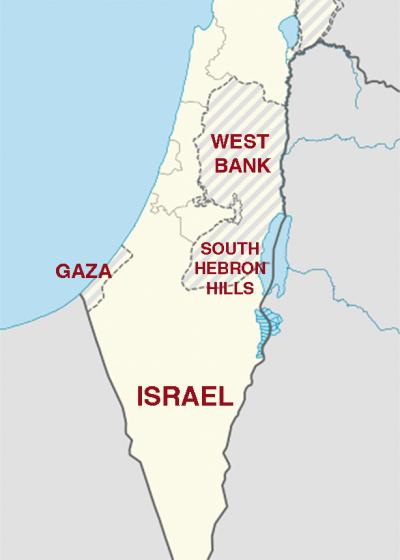
text added by Betty Avery
Eid Sulieman says the war in Gaza has created cover for increased violence against Palestinians in the West Bank, including in his village.
Gaza and the West Bank are geographically separated Palestinian territories. The main hostilities now are in Gaza, where Hamas is based. Violence of a different form is increasing in the West Bank.
Speaking by phone from his village, Umm Al Khair in the South Hebron Hills, Sulieman tells of the masked Israeli settlers in Israel Defense Forces uniforms who showed up two nights earlier with automatic weapons. They held Sulieman and 16 other men on their knees at gunpoint for an hour and a half. The captives were told they would be shot if they moved. Phones were taken away. People were kicked in the back. There was a lot of shouting.
“It was very tense,” Sulieman says, noting that machine guns were pointed at their heads.
Sulieman says the men insisted he and his fellow captives condemn the Hamas attacks. Sulieman informed the men he did not need to be forced to condemn the attacks. He had done so long before the men arrived.
“I condemn all the killing of human beings from both Israelis and Palestinians,” he says. “This makes me sad.”
Eventually Sulieman and the others were released. “It was crazy,” he says repeatedly.
This sort of intimidation and violence has increased significantly in the West Bank since the Hamas attacks in Israel on October 7. Sulieman says that for Palestinians, the West Bank is more dangerous now than ever before.
In the nearby village of Susiya, Israelis blocked the roads into the village, destroyed water infrastructure and beat residents. As part of ongoing threats, Sulieman says settlers knocked on every door in the village and told people they needed to leave in 24 hours or they would be shot. “This is very terrifying for my friends there,” he says.
The Israeli Information Center for Human Rights in the Occupied Territories, an NGO also known as B’Tselem, reports that 13 small Palestinian communities have been forcibly transferred “under cover” of the Gaza war. In some cases, Israeli settlers assaulted Palestinians and destroyed their property. In all cases, people in the communities faced intense threat and harassment from armed settlers and occasionally from soldiers.
Sulieman, an artist and peace advocate, provides photo documentation for B’Tselem.
The Jerusalem-based organization, started in 1989, also reports attacks on Israeli civilians by Palestinians.
According to the UN, some 700,000 Israeli settlers live in 279 settlements in the West Bank and East Jerusalem. Most countries consider these settlements illegal, as the area is designated for Palestinians. The U.S. formally objects to the settlements, yet more and more are built, directly and forcibly displacing Palestinians from their homes and lands.
Sulieman and his wife have four young daughters. He says about 20 percent of his family’s land has been confiscated. Settler homes now sit on some of it. An Israeli settler lives within several metres of Sulieman’s house. “We see them in their homes, see them walking around.”
The night before Sulieman spoke with Canadian Mennonite, settlers burned a Palestinian home in the neighbouring village. There is virtually no meaningful recourse for Palestinians. Israeli settlers act with near impunity. “There is no law to stop them,” Sulieman says, noting that only the tiniest fraction of complaints registered with the Israeli police ever come to anything.
Sulieman speaks with the tone of someone who is irrepressibly upbeat, a glowing spirit.
But he says he feels “very helpless.” Given the constant encroachment of Israel, he wonders whether any Palestinians will be left in that area of the West Bank—known as Area C—in 10 years. “The future is very, very black,” he says. “You don’t know what will happen tomorrow.”
At times, Sulieman can hear the bombs exploding in Gaza. Stray rockets launched from Gaza have landed nearby. Violence is all around in many forms.
The energy in Sulieman’s voice wanes. “We pray that the war will stop,” he says. “Maybe peace will come one day. . . . We hope, but hope nowadays is very, very less.”



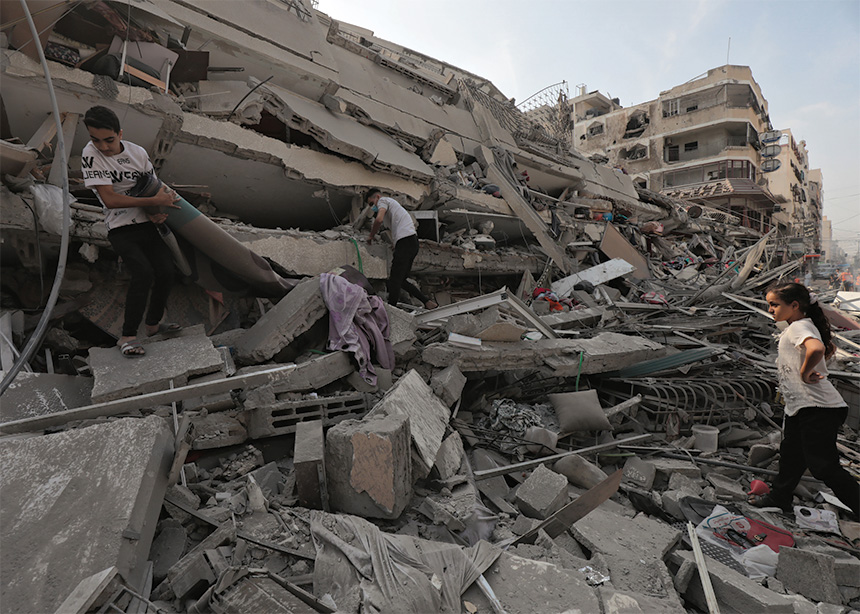

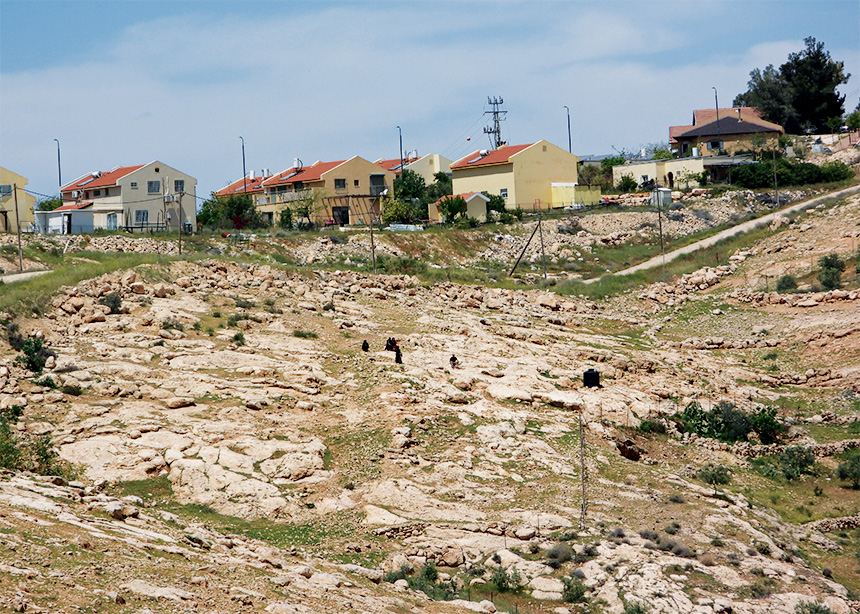

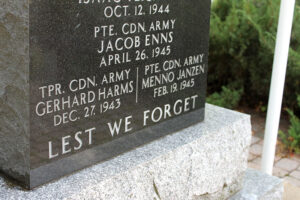

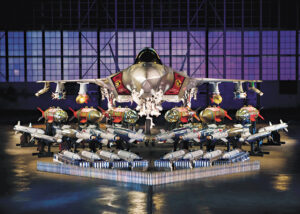

Leave a Reply
You must be logged in to post a comment.